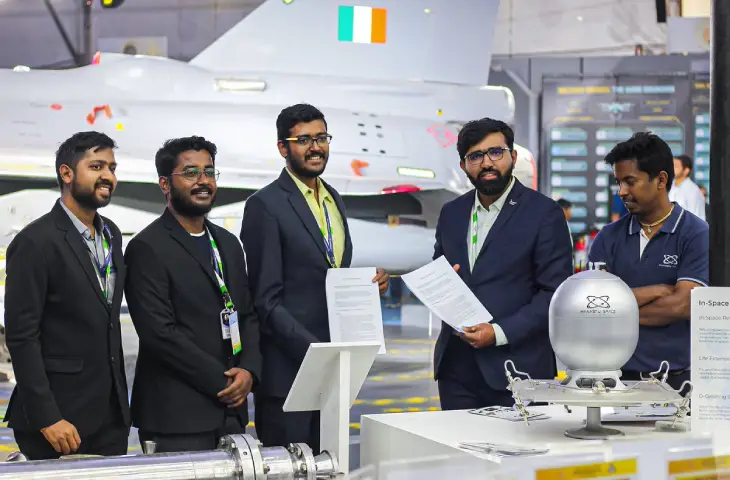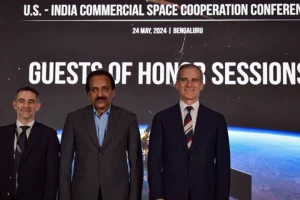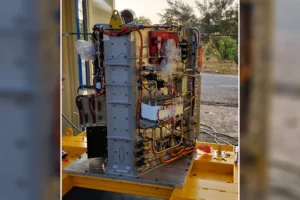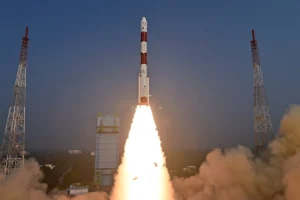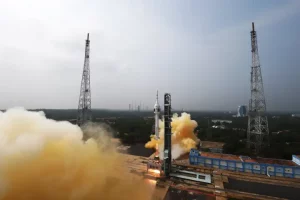An alumnus of IIT Bombay, Tushar Jhadav, a young space entrepreneur or “Spacepreneur” leveraged his specialisation in aerospace engineering into space technology. After steering and successfully negotiating with ISRO on launching a satellite developed at IIT to predict Tsunamis, Jhadav went on to launch Manastu Space, a space tech company. In a conversation with Mark Kinra, Jhadav details the emergence of India’s new space tech ecosystem driven by private enterprise with apexed by the Indian Space Research Organisation, as well as the challenges that lie ahead. Excerpts from the interview.
Q) Tell us about yourself and what motivated you to become a scientist?
I am Tushar Jadhav from Nashik. While doing my dual degree in Aerospace Engineering from IIT Bombay, I came across students who were building a satellite which caught my attention as this was the kind of thing I wanted to do. It was 2009, space was still new and most students were fixated on robotics etc. Luckily for me, my mentor was leading the student satellite program of IIT Bombay and soon I ended up being part of the team. The satellite we were working on could predict an early warning of the Tsunami, a 10–15-minute warning before the Tsunami hit the shore. It was then that we realised how the power of space can save lives and this also became the purpose of our current startup, where space technology can be used to solve the problems on earth. In my 4th year of IIT, I became a project manager where I had a lot of challenging tasks like negotiating with the Indian Space Research Organization (ISRO) to put this satellite onto their rocket, keeping up the morale of the team while they continued to work without any remuneration etc. and finally when in 2016 the satellite was launched through an ISRO rocket into the space, it was like a dream come true. We all cried that day. We had worked for 6-7 years on this project and there were times when we thought to shut down the project but eventually, we sailed. Something changed that day. I realized this is my passion and I want to do something in this sector for my country and becoming a scientist and/or making a startup was the logical way to do it. And that is why I thought of becoming a scientist or entrepreneur, whatever you want to call it.
Q) After finishing college, did you start your journey as a Spacepreneur?
Ans. No, after my graduation in 2014-15, I joined the Defence Research and Development Organization (DRDO) where I worked on the Kaveri Class fighter jet engine which was initially designed for the TEJAS fighter jet. In 2017, I started my spacepreneurship journey.
Q) You have your own space company now, Manastu Space. Please tell us more about it.
Ans. Before answering what we do, it is important to know why we do it. The purpose of building Space Technology Company is to provide the benefit of space to every person on Earth and for that we need to ensure that the space remains sustainable. So, that was a major way for us when we started Manastu Space.
At Manastu Space, we are building a ‘Green Propulsion System’ for satellites. So, when I say propulsion system, you can imagine it is like a steering wheel and an engine for a car, what the job of a steering wheel and an engine is for the car is, the same is the job of a propulsion system for a satellite, to manoeuvre a satellite and position in the right direction from the incoming problem of space debris. Very high-velocity debris coming towards the satellite can potentially destroy or damage the satellite. Also, we are working towards a new fuel as the current fuel that goes into the satellite is very toxic and carcinogenic, people globally are looking to get rid of it and are trying to find some alternatives plus it is very costly. To solve this problem, we are developing a system that is safe to handle and gives higher efficiency at a lower cost.
Space start up Manastu Space Technologies founded by 2 IIT Bombay alumni have developed the I Booster, a green propulsion system that uses high performance and eco-friendly fuel to boost the performance of satellites. More : https://t.co/uRWWDpDKgw pic.twitter.com/NKIBb8HKHc
— Strategic Frontier (@strategicfront) May 26, 2020
Q) ISRO as a government entity is reaching great heights but why do you think private companies need to enter this arena?
Ans. As the name suggests ISRO’s, focus should be on research, they can do only so much with the current available resources and with their mandate. ISRO does have a commercial arm but it is mainly to commercialize some of the technology and transfer it to industry, to provide some of the services. Currently, the launching of satellites is one of their services, slowly that will also move towards private industry as they transferred the PSLV rockets so that the industry can do it in a much more efficient way, optimize it in terms of production, cost, and frequencies. So that is where the L&T, Godrej and HAL come into the picture where they can bring the business aspects.
Q) Do you see yourself as a research company or as a business-based company?
Ans. Our foundation is research and based on research we are building a sustainable business so we are fusing the two. Intellectual Property comes from research, such innovations will lead to market growth; Israel’s Silicon Valley is the biggest example of that. So, unless we do our research and development, we will not have the growth that we want to target. New Age companies must be based on research because we do not have a legacy of billions of dollars, so to find out our niche it must be based on something original.
.@iigp2 2018 winner, Tushar Jadhav, Co-founder & CEO, @ManastuSpace, has built a green proportion technology that helps reduce operational cost for satellites. If your idea carries the solution for a better tomorrow, we’re ready to fuel it. Register here: https://t.co/jEgbzXu3mh pic.twitter.com/VIktkBlFnE
— Lockheed Martin India (@LMIndiaNews) April 19, 2019
Q) How is the innovation scene in India and what is the government support to private enterprises?
Ans. If you had asked me this question three to five years back my answer would have been very tough, especially in terms of investment. The R&D budget is one of the lowest in India, compared to the major economies. Since COVID-19, the scene has changed drastically and the Indian ecosystem is coming to maturity. If you see the progression in terms of investment, the first stage companies were the startups for services that got funded, then came the app-based startups, then hardware and last two to three years, the burning issues of the world have been getting priority in terms of investment like climate, space, biotech, healthcare etc. those are the signs of ecosystem getting mature, the VC system getting mature and the Indian customers are going mature.
Before ‘Startup India’ and ‘Make in India,’ the government was very wary of startups and startups were not considered very reliable but that mindset has changed and now startups are getting contracts from the government, especially in our area of defence and space. So that mindset shift has helped the startups a lot because startups need validation before investors put in some money. Thankfully, there are a lot of schemes to support startups, in our case; there is the TDF and IDEX. Soon you will see in the next three to five years the company that got funded has done a lot of wonders to the overall ecosystem, thanks to these schemes and that will shift the mindset of the investor also. Still, a lot more work needs to be done, especially in terms of the infrastructure, the talent, access to the talent, the skill set of the talent level, collaboration with the universities and startups etc. are few of the issues that we need to work in parallel to get better results.
Q) What do you think should be the aim of the Indian space industry for the next 25 years?
Ans. The world is changing at a fast pace whatever took 10 years to build earlier, now that timeline has come down to 2-3 years, cost is playing a very significant role and that’s where India has the benefit. The task for the next 25 years should be capitalization of market share in terms of bringing innovative products and services into the market in a short period. Another thing is how with cutting-edge technologies, India can build like going to different planets and doing meaningful research, preparing return missions, building something in space etc., should be the direction of space technologies in coming years.
Q) What message do you have for young children who are aiming to become scientists?
Ans. Unless somebody wants only then they should become scientists and then do not look back. This century belongs to India, Indian startups and Indian scientists and it is the best time to be in India. We are developing something cutting-edge for the world. I believe today is ours and tomorrow will also be ours.
Also Read: Atal Innovation Mission to host event to channel young talent into space research






